Pedagogics Essay: Problems, Solutions in the Education System
VerifiedAdded on 2023/05/29
|8
|1894
|243
Essay
AI Summary
This essay provides a comparative analysis of five articles focusing on education and pedagogical practices, highlighting their impact on students. It identifies problems within the education system, such as the failure to recognize diverse learning styles, the perceived redundancy of the system, over-reliance on technology, and the treatment of students. The essay then explores proposed solutions, including incorporating physical gestures in teaching, promoting physical activities, providing individual attention, encouraging innovation, and balancing human and artificial intellect. The scholars offer unique approaches to addressing these issues, emphasizing the need for enhanced educational experiences for both students and teachers. The essay concludes by acknowledging the importance of implementing these contributions to improve the education system. This document is contributed by a student to be published on the website Desklib. Desklib is a platform which provides all the necessary AI based study tools for students.
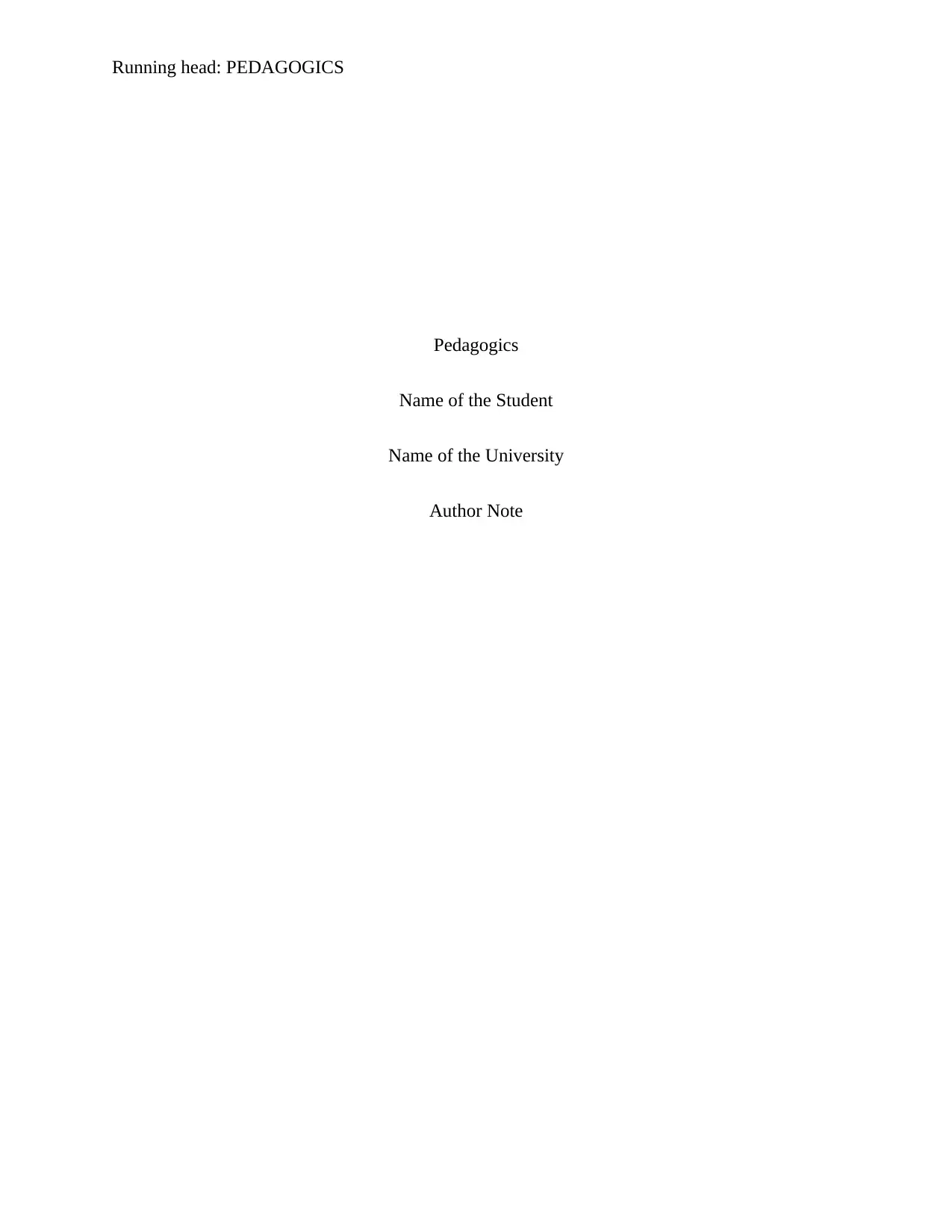
Running head: PEDAGOGICS
Pedagogics
Name of the Student
Name of the University
Author Note
Pedagogics
Name of the Student
Name of the University
Author Note
Paraphrase This Document
Need a fresh take? Get an instant paraphrase of this document with our AI Paraphraser
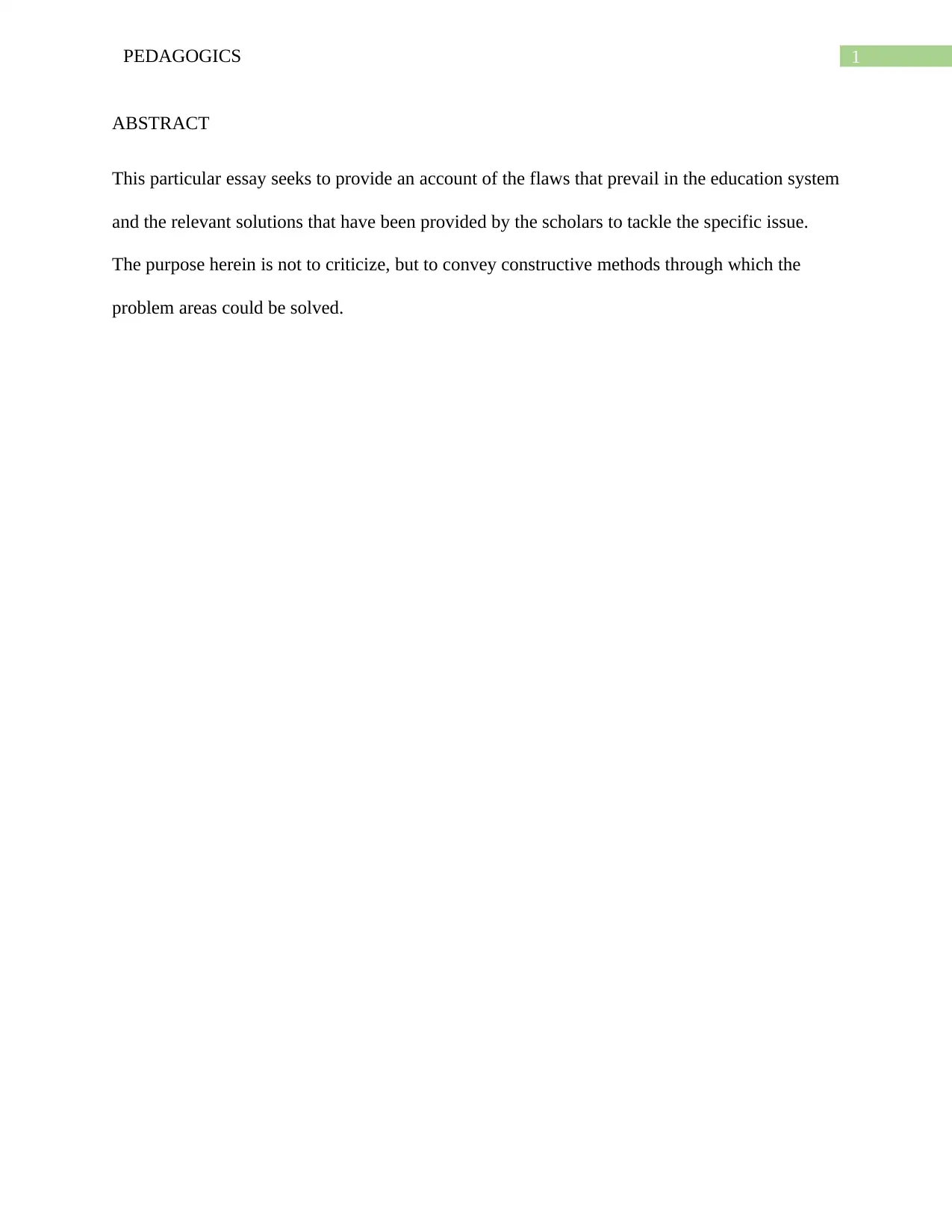
1PEDAGOGICS
ABSTRACT
This particular essay seeks to provide an account of the flaws that prevail in the education system
and the relevant solutions that have been provided by the scholars to tackle the specific issue.
The purpose herein is not to criticize, but to convey constructive methods through which the
problem areas could be solved.
ABSTRACT
This particular essay seeks to provide an account of the flaws that prevail in the education system
and the relevant solutions that have been provided by the scholars to tackle the specific issue.
The purpose herein is not to criticize, but to convey constructive methods through which the
problem areas could be solved.
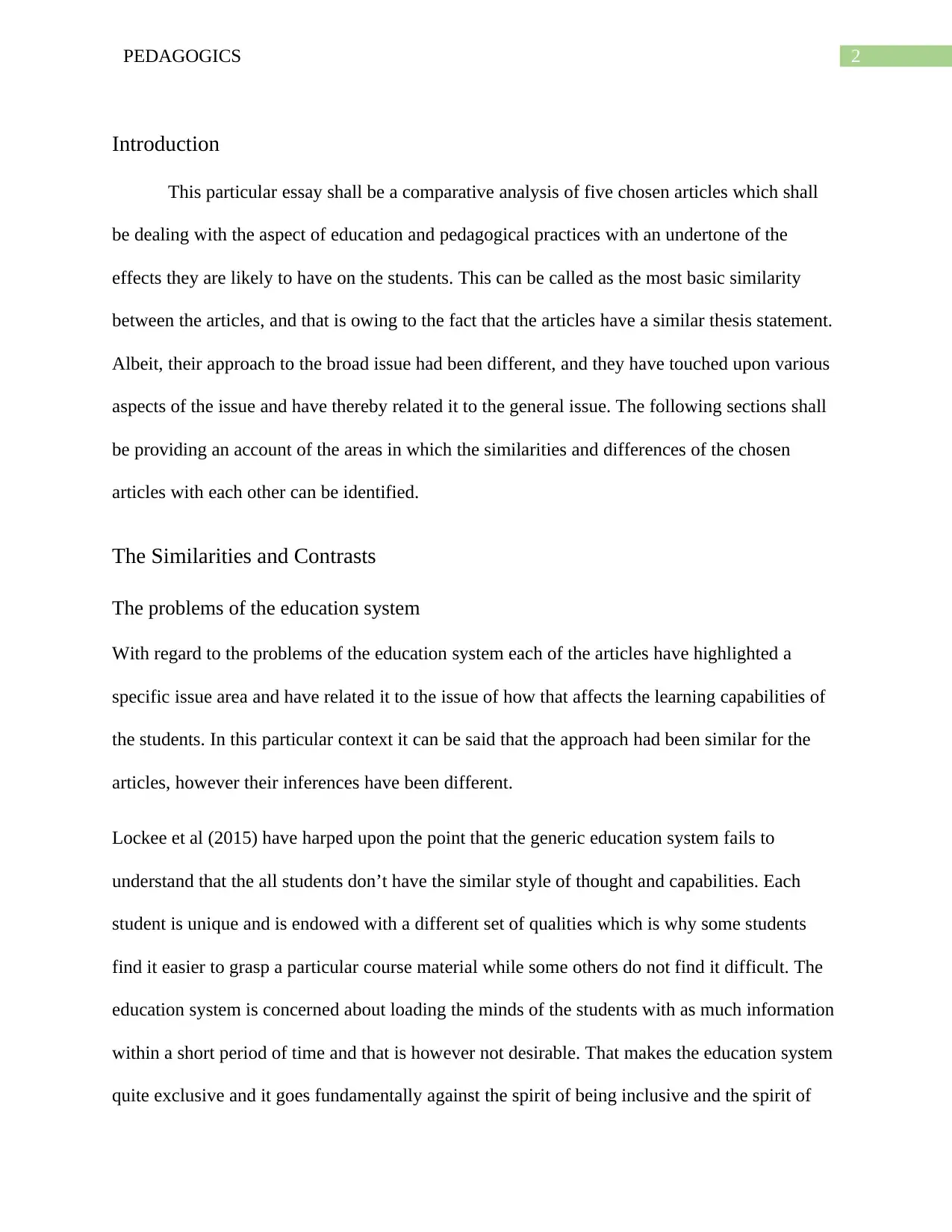
2PEDAGOGICS
Introduction
This particular essay shall be a comparative analysis of five chosen articles which shall
be dealing with the aspect of education and pedagogical practices with an undertone of the
effects they are likely to have on the students. This can be called as the most basic similarity
between the articles, and that is owing to the fact that the articles have a similar thesis statement.
Albeit, their approach to the broad issue had been different, and they have touched upon various
aspects of the issue and have thereby related it to the general issue. The following sections shall
be providing an account of the areas in which the similarities and differences of the chosen
articles with each other can be identified.
The Similarities and Contrasts
The problems of the education system
With regard to the problems of the education system each of the articles have highlighted a
specific issue area and have related it to the issue of how that affects the learning capabilities of
the students. In this particular context it can be said that the approach had been similar for the
articles, however their inferences have been different.
Lockee et al (2015) have harped upon the point that the generic education system fails to
understand that the all students don’t have the similar style of thought and capabilities. Each
student is unique and is endowed with a different set of qualities which is why some students
find it easier to grasp a particular course material while some others do not find it difficult. The
education system is concerned about loading the minds of the students with as much information
within a short period of time and that is however not desirable. That makes the education system
quite exclusive and it goes fundamentally against the spirit of being inclusive and the spirit of
Introduction
This particular essay shall be a comparative analysis of five chosen articles which shall
be dealing with the aspect of education and pedagogical practices with an undertone of the
effects they are likely to have on the students. This can be called as the most basic similarity
between the articles, and that is owing to the fact that the articles have a similar thesis statement.
Albeit, their approach to the broad issue had been different, and they have touched upon various
aspects of the issue and have thereby related it to the general issue. The following sections shall
be providing an account of the areas in which the similarities and differences of the chosen
articles with each other can be identified.
The Similarities and Contrasts
The problems of the education system
With regard to the problems of the education system each of the articles have highlighted a
specific issue area and have related it to the issue of how that affects the learning capabilities of
the students. In this particular context it can be said that the approach had been similar for the
articles, however their inferences have been different.
Lockee et al (2015) have harped upon the point that the generic education system fails to
understand that the all students don’t have the similar style of thought and capabilities. Each
student is unique and is endowed with a different set of qualities which is why some students
find it easier to grasp a particular course material while some others do not find it difficult. The
education system is concerned about loading the minds of the students with as much information
within a short period of time and that is however not desirable. That makes the education system
quite exclusive and it goes fundamentally against the spirit of being inclusive and the spirit of
⊘ This is a preview!⊘
Do you want full access?
Subscribe today to unlock all pages.

Trusted by 1+ million students worldwide
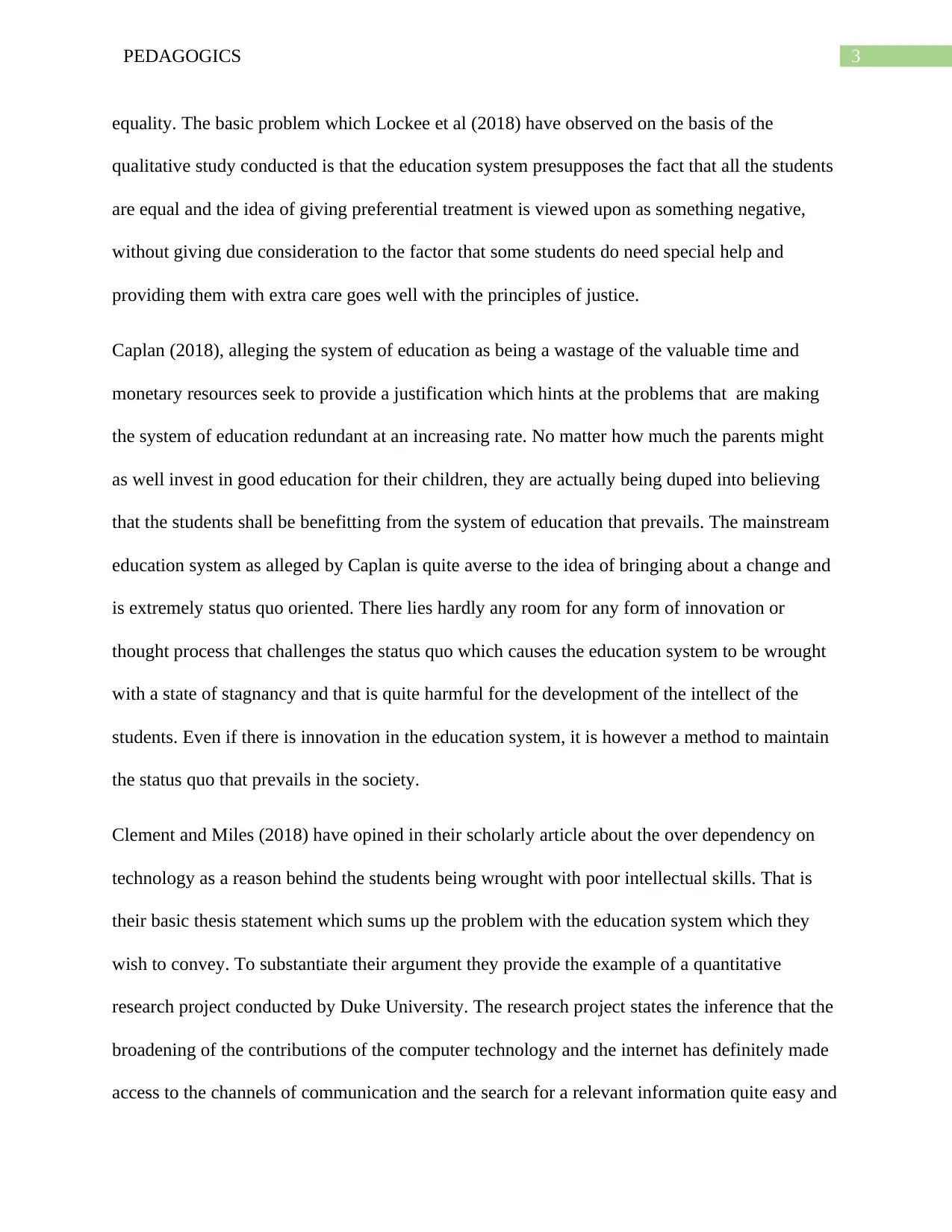
3PEDAGOGICS
equality. The basic problem which Lockee et al (2018) have observed on the basis of the
qualitative study conducted is that the education system presupposes the fact that all the students
are equal and the idea of giving preferential treatment is viewed upon as something negative,
without giving due consideration to the factor that some students do need special help and
providing them with extra care goes well with the principles of justice.
Caplan (2018), alleging the system of education as being a wastage of the valuable time and
monetary resources seek to provide a justification which hints at the problems that are making
the system of education redundant at an increasing rate. No matter how much the parents might
as well invest in good education for their children, they are actually being duped into believing
that the students shall be benefitting from the system of education that prevails. The mainstream
education system as alleged by Caplan is quite averse to the idea of bringing about a change and
is extremely status quo oriented. There lies hardly any room for any form of innovation or
thought process that challenges the status quo which causes the education system to be wrought
with a state of stagnancy and that is quite harmful for the development of the intellect of the
students. Even if there is innovation in the education system, it is however a method to maintain
the status quo that prevails in the society.
Clement and Miles (2018) have opined in their scholarly article about the over dependency on
technology as a reason behind the students being wrought with poor intellectual skills. That is
their basic thesis statement which sums up the problem with the education system which they
wish to convey. To substantiate their argument they provide the example of a quantitative
research project conducted by Duke University. The research project states the inference that the
broadening of the contributions of the computer technology and the internet has definitely made
access to the channels of communication and the search for a relevant information quite easy and
equality. The basic problem which Lockee et al (2018) have observed on the basis of the
qualitative study conducted is that the education system presupposes the fact that all the students
are equal and the idea of giving preferential treatment is viewed upon as something negative,
without giving due consideration to the factor that some students do need special help and
providing them with extra care goes well with the principles of justice.
Caplan (2018), alleging the system of education as being a wastage of the valuable time and
monetary resources seek to provide a justification which hints at the problems that are making
the system of education redundant at an increasing rate. No matter how much the parents might
as well invest in good education for their children, they are actually being duped into believing
that the students shall be benefitting from the system of education that prevails. The mainstream
education system as alleged by Caplan is quite averse to the idea of bringing about a change and
is extremely status quo oriented. There lies hardly any room for any form of innovation or
thought process that challenges the status quo which causes the education system to be wrought
with a state of stagnancy and that is quite harmful for the development of the intellect of the
students. Even if there is innovation in the education system, it is however a method to maintain
the status quo that prevails in the society.
Clement and Miles (2018) have opined in their scholarly article about the over dependency on
technology as a reason behind the students being wrought with poor intellectual skills. That is
their basic thesis statement which sums up the problem with the education system which they
wish to convey. To substantiate their argument they provide the example of a quantitative
research project conducted by Duke University. The research project states the inference that the
broadening of the contributions of the computer technology and the internet has definitely made
access to the channels of communication and the search for a relevant information quite easy and
Paraphrase This Document
Need a fresh take? Get an instant paraphrase of this document with our AI Paraphraser
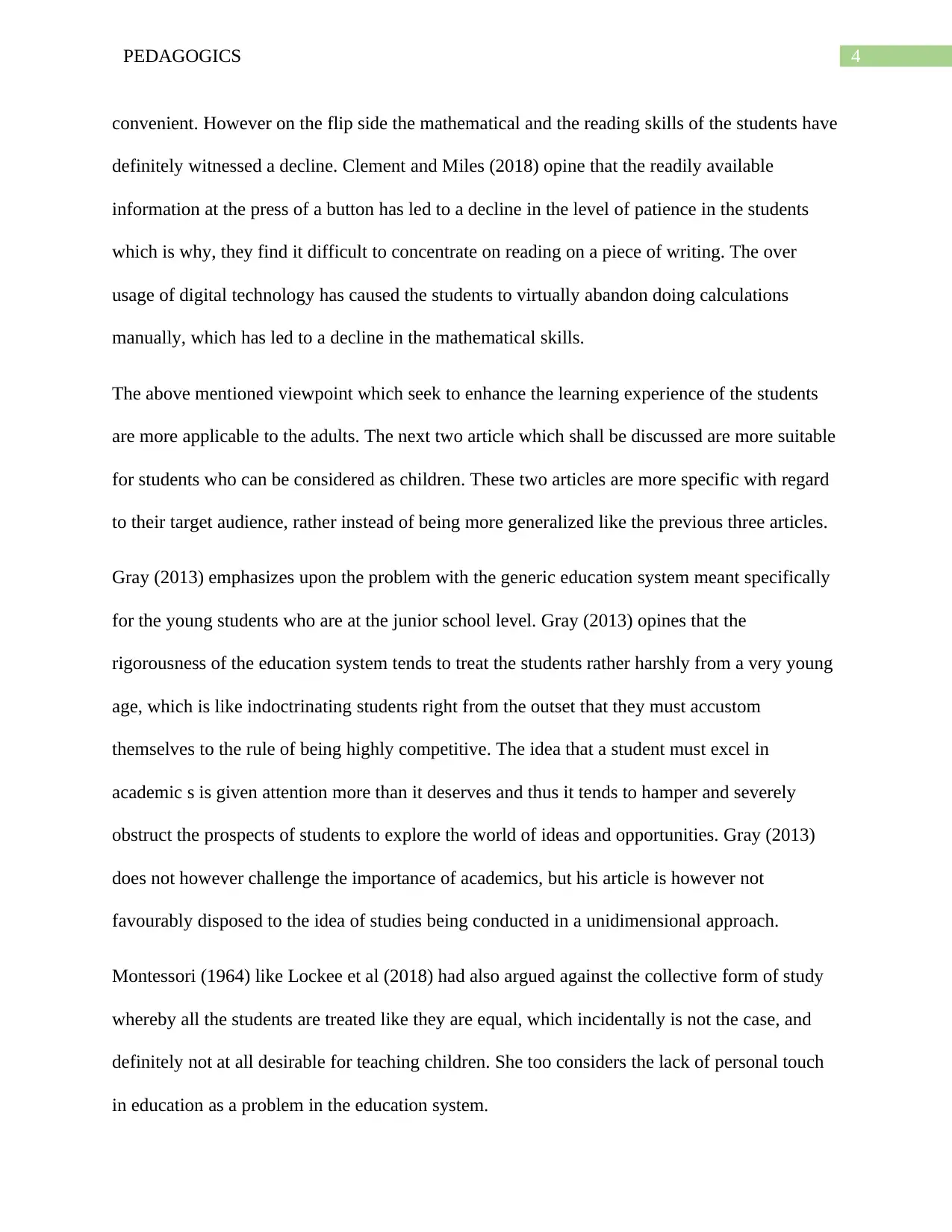
4PEDAGOGICS
convenient. However on the flip side the mathematical and the reading skills of the students have
definitely witnessed a decline. Clement and Miles (2018) opine that the readily available
information at the press of a button has led to a decline in the level of patience in the students
which is why, they find it difficult to concentrate on reading on a piece of writing. The over
usage of digital technology has caused the students to virtually abandon doing calculations
manually, which has led to a decline in the mathematical skills.
The above mentioned viewpoint which seek to enhance the learning experience of the students
are more applicable to the adults. The next two article which shall be discussed are more suitable
for students who can be considered as children. These two articles are more specific with regard
to their target audience, rather instead of being more generalized like the previous three articles.
Gray (2013) emphasizes upon the problem with the generic education system meant specifically
for the young students who are at the junior school level. Gray (2013) opines that the
rigorousness of the education system tends to treat the students rather harshly from a very young
age, which is like indoctrinating students right from the outset that they must accustom
themselves to the rule of being highly competitive. The idea that a student must excel in
academic s is given attention more than it deserves and thus it tends to hamper and severely
obstruct the prospects of students to explore the world of ideas and opportunities. Gray (2013)
does not however challenge the importance of academics, but his article is however not
favourably disposed to the idea of studies being conducted in a unidimensional approach.
Montessori (1964) like Lockee et al (2018) had also argued against the collective form of study
whereby all the students are treated like they are equal, which incidentally is not the case, and
definitely not at all desirable for teaching children. She too considers the lack of personal touch
in education as a problem in the education system.
convenient. However on the flip side the mathematical and the reading skills of the students have
definitely witnessed a decline. Clement and Miles (2018) opine that the readily available
information at the press of a button has led to a decline in the level of patience in the students
which is why, they find it difficult to concentrate on reading on a piece of writing. The over
usage of digital technology has caused the students to virtually abandon doing calculations
manually, which has led to a decline in the mathematical skills.
The above mentioned viewpoint which seek to enhance the learning experience of the students
are more applicable to the adults. The next two article which shall be discussed are more suitable
for students who can be considered as children. These two articles are more specific with regard
to their target audience, rather instead of being more generalized like the previous three articles.
Gray (2013) emphasizes upon the problem with the generic education system meant specifically
for the young students who are at the junior school level. Gray (2013) opines that the
rigorousness of the education system tends to treat the students rather harshly from a very young
age, which is like indoctrinating students right from the outset that they must accustom
themselves to the rule of being highly competitive. The idea that a student must excel in
academic s is given attention more than it deserves and thus it tends to hamper and severely
obstruct the prospects of students to explore the world of ideas and opportunities. Gray (2013)
does not however challenge the importance of academics, but his article is however not
favourably disposed to the idea of studies being conducted in a unidimensional approach.
Montessori (1964) like Lockee et al (2018) had also argued against the collective form of study
whereby all the students are treated like they are equal, which incidentally is not the case, and
definitely not at all desirable for teaching children. She too considers the lack of personal touch
in education as a problem in the education system.
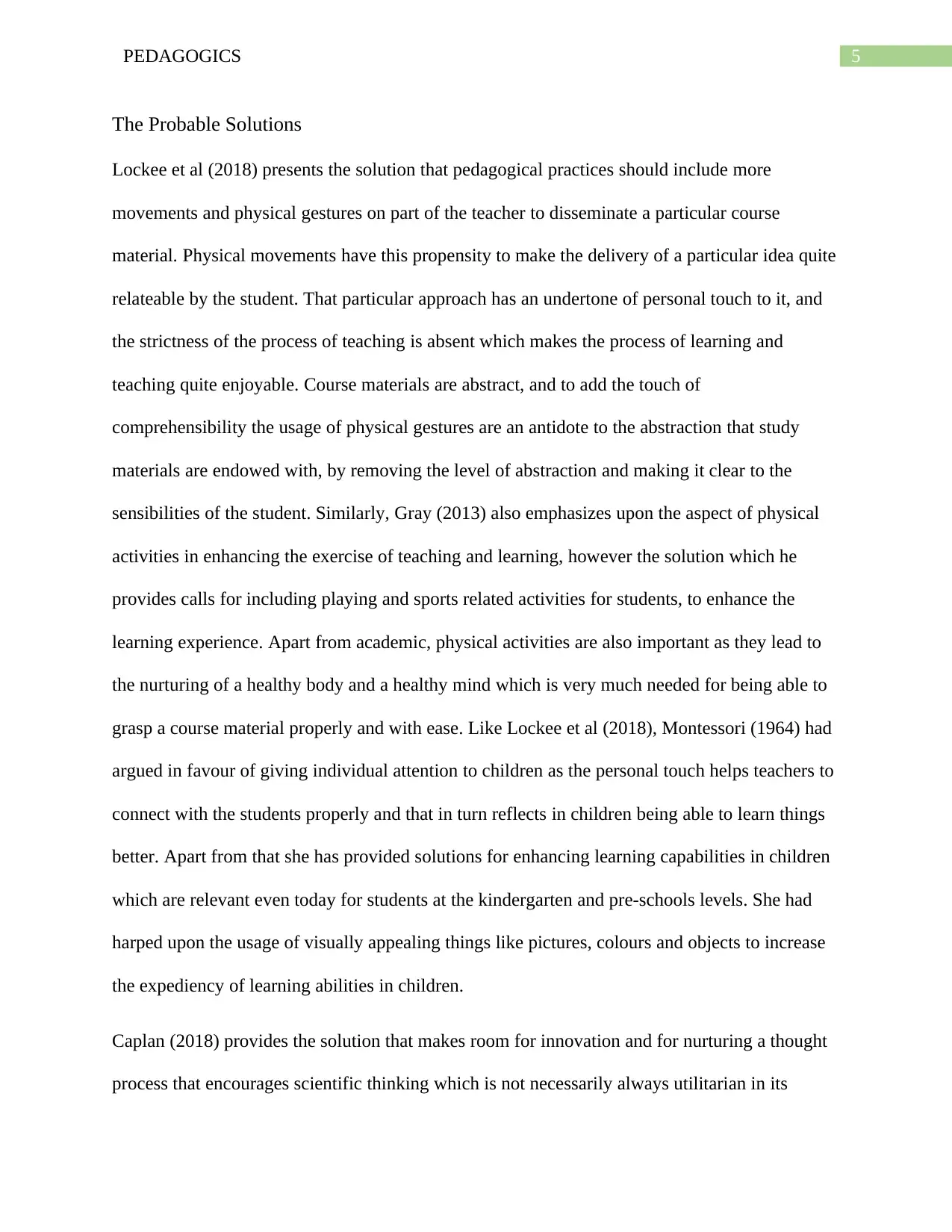
5PEDAGOGICS
The Probable Solutions
Lockee et al (2018) presents the solution that pedagogical practices should include more
movements and physical gestures on part of the teacher to disseminate a particular course
material. Physical movements have this propensity to make the delivery of a particular idea quite
relateable by the student. That particular approach has an undertone of personal touch to it, and
the strictness of the process of teaching is absent which makes the process of learning and
teaching quite enjoyable. Course materials are abstract, and to add the touch of
comprehensibility the usage of physical gestures are an antidote to the abstraction that study
materials are endowed with, by removing the level of abstraction and making it clear to the
sensibilities of the student. Similarly, Gray (2013) also emphasizes upon the aspect of physical
activities in enhancing the exercise of teaching and learning, however the solution which he
provides calls for including playing and sports related activities for students, to enhance the
learning experience. Apart from academic, physical activities are also important as they lead to
the nurturing of a healthy body and a healthy mind which is very much needed for being able to
grasp a course material properly and with ease. Like Lockee et al (2018), Montessori (1964) had
argued in favour of giving individual attention to children as the personal touch helps teachers to
connect with the students properly and that in turn reflects in children being able to learn things
better. Apart from that she has provided solutions for enhancing learning capabilities in children
which are relevant even today for students at the kindergarten and pre-schools levels. She had
harped upon the usage of visually appealing things like pictures, colours and objects to increase
the expediency of learning abilities in children.
Caplan (2018) provides the solution that makes room for innovation and for nurturing a thought
process that encourages scientific thinking which is not necessarily always utilitarian in its
The Probable Solutions
Lockee et al (2018) presents the solution that pedagogical practices should include more
movements and physical gestures on part of the teacher to disseminate a particular course
material. Physical movements have this propensity to make the delivery of a particular idea quite
relateable by the student. That particular approach has an undertone of personal touch to it, and
the strictness of the process of teaching is absent which makes the process of learning and
teaching quite enjoyable. Course materials are abstract, and to add the touch of
comprehensibility the usage of physical gestures are an antidote to the abstraction that study
materials are endowed with, by removing the level of abstraction and making it clear to the
sensibilities of the student. Similarly, Gray (2013) also emphasizes upon the aspect of physical
activities in enhancing the exercise of teaching and learning, however the solution which he
provides calls for including playing and sports related activities for students, to enhance the
learning experience. Apart from academic, physical activities are also important as they lead to
the nurturing of a healthy body and a healthy mind which is very much needed for being able to
grasp a course material properly and with ease. Like Lockee et al (2018), Montessori (1964) had
argued in favour of giving individual attention to children as the personal touch helps teachers to
connect with the students properly and that in turn reflects in children being able to learn things
better. Apart from that she has provided solutions for enhancing learning capabilities in children
which are relevant even today for students at the kindergarten and pre-schools levels. She had
harped upon the usage of visually appealing things like pictures, colours and objects to increase
the expediency of learning abilities in children.
Caplan (2018) provides the solution that makes room for innovation and for nurturing a thought
process that encourages scientific thinking which is not necessarily always utilitarian in its
⊘ This is a preview!⊘
Do you want full access?
Subscribe today to unlock all pages.

Trusted by 1+ million students worldwide
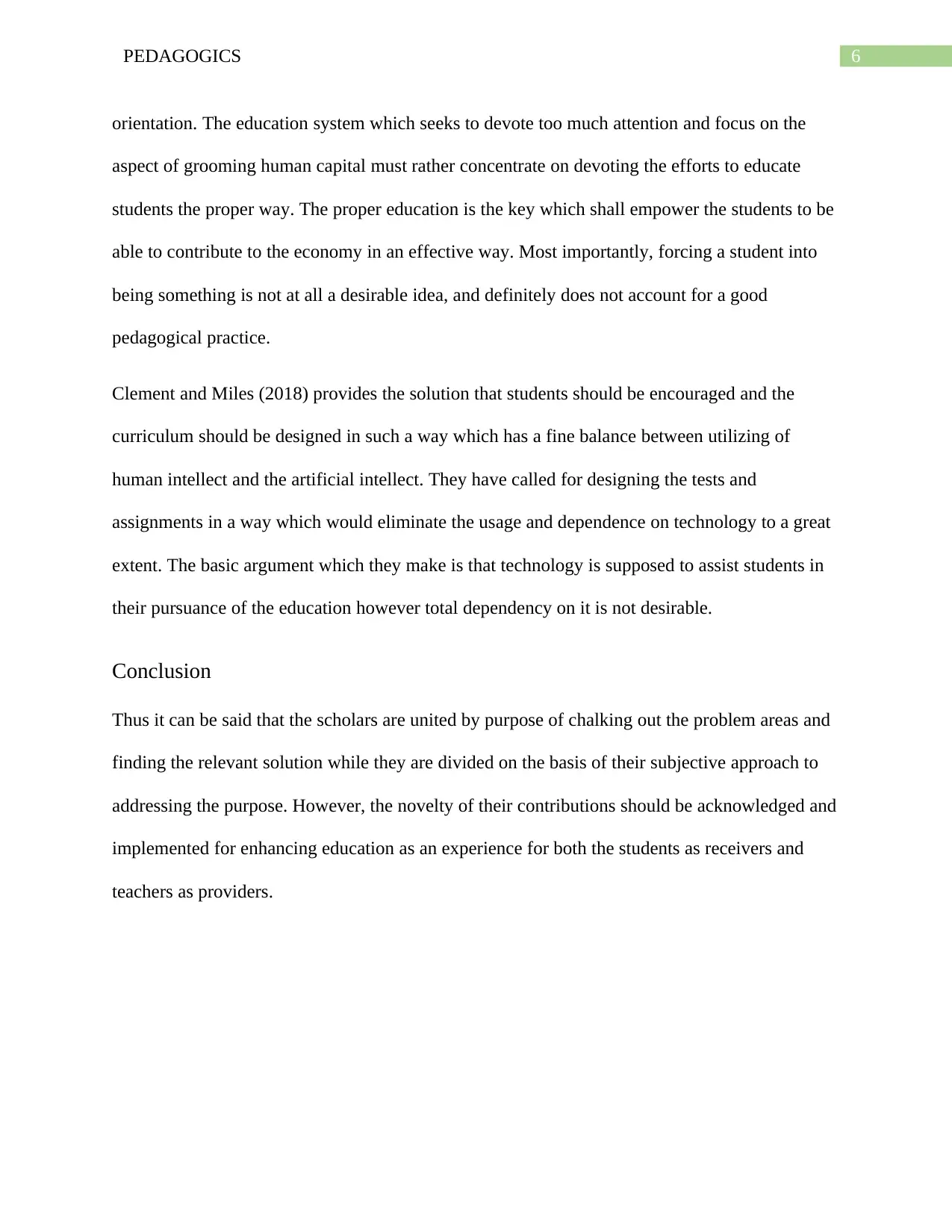
6PEDAGOGICS
orientation. The education system which seeks to devote too much attention and focus on the
aspect of grooming human capital must rather concentrate on devoting the efforts to educate
students the proper way. The proper education is the key which shall empower the students to be
able to contribute to the economy in an effective way. Most importantly, forcing a student into
being something is not at all a desirable idea, and definitely does not account for a good
pedagogical practice.
Clement and Miles (2018) provides the solution that students should be encouraged and the
curriculum should be designed in such a way which has a fine balance between utilizing of
human intellect and the artificial intellect. They have called for designing the tests and
assignments in a way which would eliminate the usage and dependence on technology to a great
extent. The basic argument which they make is that technology is supposed to assist students in
their pursuance of the education however total dependency on it is not desirable.
Conclusion
Thus it can be said that the scholars are united by purpose of chalking out the problem areas and
finding the relevant solution while they are divided on the basis of their subjective approach to
addressing the purpose. However, the novelty of their contributions should be acknowledged and
implemented for enhancing education as an experience for both the students as receivers and
teachers as providers.
orientation. The education system which seeks to devote too much attention and focus on the
aspect of grooming human capital must rather concentrate on devoting the efforts to educate
students the proper way. The proper education is the key which shall empower the students to be
able to contribute to the economy in an effective way. Most importantly, forcing a student into
being something is not at all a desirable idea, and definitely does not account for a good
pedagogical practice.
Clement and Miles (2018) provides the solution that students should be encouraged and the
curriculum should be designed in such a way which has a fine balance between utilizing of
human intellect and the artificial intellect. They have called for designing the tests and
assignments in a way which would eliminate the usage and dependence on technology to a great
extent. The basic argument which they make is that technology is supposed to assist students in
their pursuance of the education however total dependency on it is not desirable.
Conclusion
Thus it can be said that the scholars are united by purpose of chalking out the problem areas and
finding the relevant solution while they are divided on the basis of their subjective approach to
addressing the purpose. However, the novelty of their contributions should be acknowledged and
implemented for enhancing education as an experience for both the students as receivers and
teachers as providers.
Paraphrase This Document
Need a fresh take? Get an instant paraphrase of this document with our AI Paraphraser
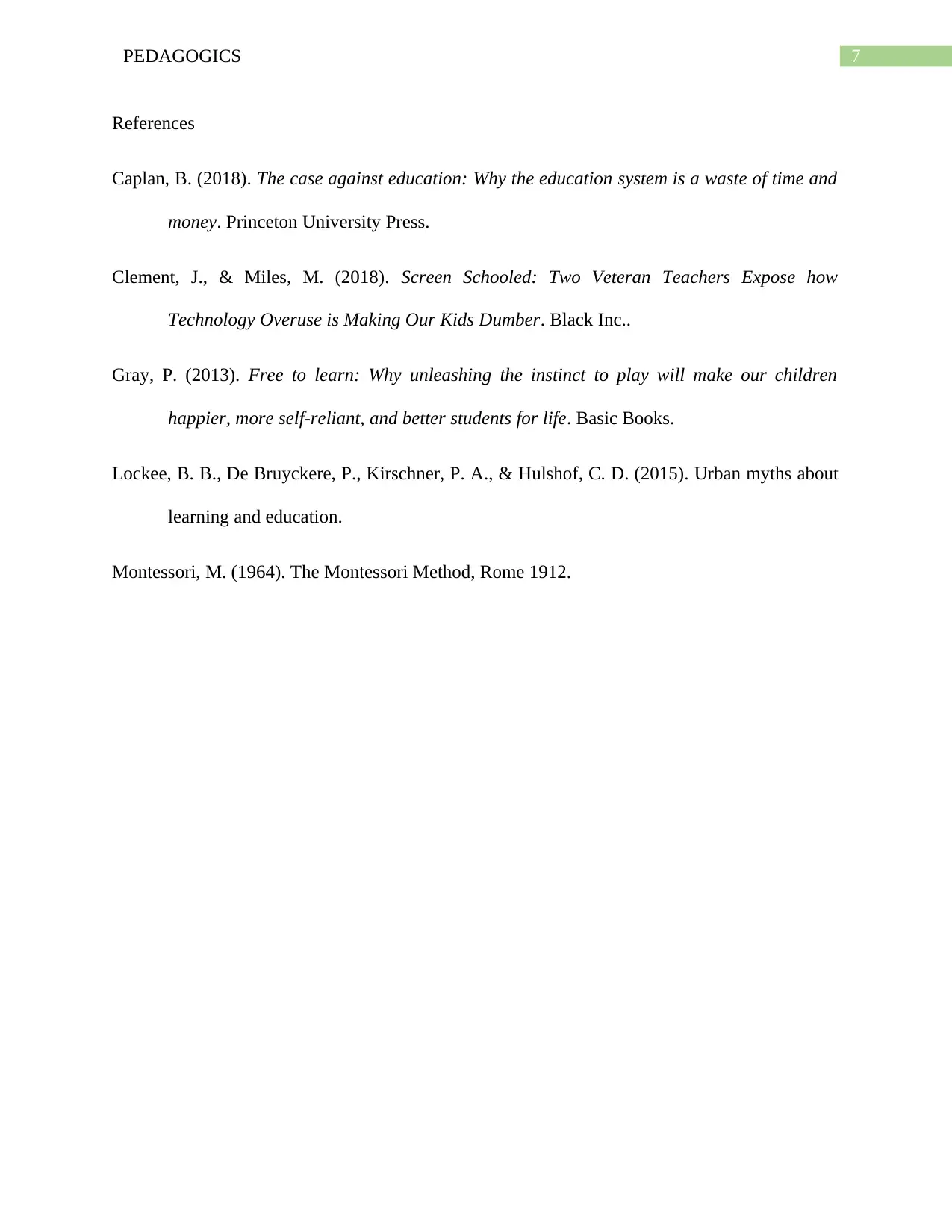
7PEDAGOGICS
References
Caplan, B. (2018). The case against education: Why the education system is a waste of time and
money. Princeton University Press.
Clement, J., & Miles, M. (2018). Screen Schooled: Two Veteran Teachers Expose how
Technology Overuse is Making Our Kids Dumber. Black Inc..
Gray, P. (2013). Free to learn: Why unleashing the instinct to play will make our children
happier, more self-reliant, and better students for life. Basic Books.
Lockee, B. B., De Bruyckere, P., Kirschner, P. A., & Hulshof, C. D. (2015). Urban myths about
learning and education.
Montessori, M. (1964). The Montessori Method, Rome 1912.
References
Caplan, B. (2018). The case against education: Why the education system is a waste of time and
money. Princeton University Press.
Clement, J., & Miles, M. (2018). Screen Schooled: Two Veteran Teachers Expose how
Technology Overuse is Making Our Kids Dumber. Black Inc..
Gray, P. (2013). Free to learn: Why unleashing the instinct to play will make our children
happier, more self-reliant, and better students for life. Basic Books.
Lockee, B. B., De Bruyckere, P., Kirschner, P. A., & Hulshof, C. D. (2015). Urban myths about
learning and education.
Montessori, M. (1964). The Montessori Method, Rome 1912.
1 out of 8
Related Documents
Your All-in-One AI-Powered Toolkit for Academic Success.
+13062052269
info@desklib.com
Available 24*7 on WhatsApp / Email
![[object Object]](/_next/static/media/star-bottom.7253800d.svg)
Unlock your academic potential
Copyright © 2020–2026 A2Z Services. All Rights Reserved. Developed and managed by ZUCOL.




